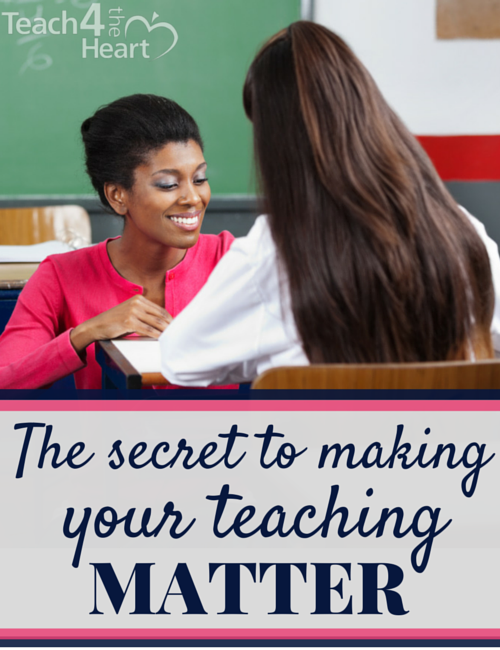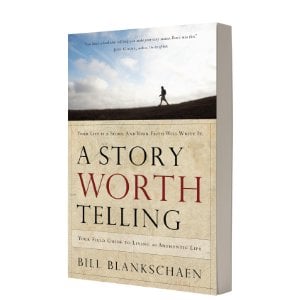I’m so excited to share with you a guest post by my friend & former principal Bill Blankschaen. I really can’t begin to tell you how much respect & admiration I have for Bill. I’m forever thankful for all he taught me about faith, teaching, and making a difference in students’ lives. Thank you, Bill. And thanks for sharing some of your wisdom with us today & in your new book. (more on that in a bit….)
What you believe to be true determines what you do each day in the classroom. What you do each day is what shapes the legacy you leave.
Before stepping out to pursue a new calling as a writer, I led a K-12 school for a dozen years. You name it, I did it – teacher, coach, athletic director, lunch monitor, student counselor, and principal. In short, I got to know all the blessings and challenges of teaching – whether I wanted to or not.
During my years as a principal, I had words stenciled on the walls of my office using clear paint so they were only visible from certain angles. I didn’t want visitors to feel as if they had fallen into a dictionary. But I did want us all to be subtly reminded of the power of words.
The word on the wall that I saw most often? Believe. The word I saw whenever someone entered or exited the room? See.
When I intentionally chose my beliefs about them, I could shape the next few lines of the life story we would write together.
Together, they reminded me that what I believed to be true about each person changed how I saw them. Regardless of their reason for coming into the principal’s office – tired teacher, misbehaving student, angry parent – when I intentionally chose my beliefs about them, I could shape the next few lines of the life story we would write together.
And all of it turned on one simple two-letter word – if.
The Magic and Power of If for Teachers
In my latest book A Story Worth Telling: Your Field Guide to Living an Authentic Life, I describe six things faith causes us to see differently. All of them are important to living an authentic life, the kind that leaves a legacy that matters. But I learned one in particular from being in the trenches with teachers.
When faith opens your eyes, we see if only turn to what if, and what if transform into teaching as if.
By faith, I mean doing what you believe to be true, often in spite of what you see, sense, or feel. Let’s face it, you don’t always feel like teaching kids who don’t appear to care. You never feel like sitting through a tirade from another frustrated parent. And you seldom get excited when the principal visits your classroom to offer feedback.
Consequently, many teachers choose to embrace the if only perspective. It sounds like this:
- If only kids these days cared more about learning than video games…
- If only parents invested more time to help their children study at home…
- If only my administrators would quit nagging me about lesson plans…
But when you realize you can shape your perspective of others by choosing what you believe to be true, you stop saying if only and start asking what if:
- What if the problem isn’t the kids, but my own teaching methods?
- What if parents want the best for their children but just feel overwhelmed by life?
- What if my principal is trying to help me become a better teacher, not find a reason to fire me?
When we begin to shift what we believe to be true about others, we open ourselves up to new possibilities. By shifting from if only to asking what if, we prepare ourselves for the break-through success that comes from teaching as if.
Imagine how different things could be if you started teaching…
- As if you need to continually improve to become and remain an engaging teacher.
- As if you have a valuable partnership with parents and an opportunity to equip them to invest in their children.
- As if you have lids on your teaching ability that can only be lifted by receiving input from others.
The bottom line is this: your beliefs about students, parents, and fellow educators will shape your legacy. You can choose to teach by excuses — if only — or by unleashing the power of teaching by faith — as if.
The teacher who chooses to see every interaction as an opportunity to believe is the one whose story will be not just told, but celebrated in places and times we cannot even imagine.
What beliefs most limit your effectiveness as a teacher? Have you ever been surprised by success when you changed your perspective about a student, parents, or school leaders and other teachers? Leave a comment….
Okay, it’s Linda again. Bill wrote up a great bio for me to share with you, but I can’t just leave such an impersonal bio at the end. If you want to grow in your faith & really learn how to make your teaching matter, you’ve got to start following Bill. He will help you connect what you read in the Bible to what you actually do every day. You can find him at FaithWalkers.com (sign up for his emails & get an awesome free ebook) or on Facebook and Twitter: @BillintheBlank.
And, seriously, you need to check out his book A Story Worth Telling. I’m about 3/4 of the way through and it is simply fantastic.
- Buy it now.
- Check out the (awesome) reviews.
- Get a FREE chapter of the book.
- Tell your pastors & ministry leaders (such as Christian school principals) that they can get a free copy here. (only available till the end of June)



I’m always concerned that the impression I leave with students can be better. And I’m about to start my 28th year!
Faith should be the driving force for all of us. Faith in the heavens and in ourselves and those we are trying to reach. Reach high.